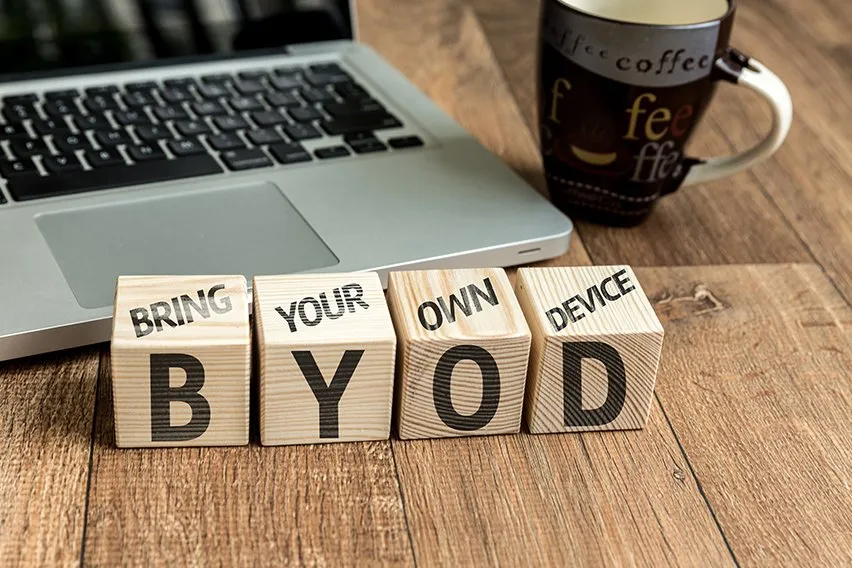What Is BYOD (Bring Your Own Device)? Definition & Importance

Bring Your Own Device (BYOD) is a practice where employees access company resources with personal devices. This happens often in many fields, with or without IT’s permission.
The important thing is to set a policy that balances convenience, privacy, and security. A well-managed BYOD policy can increase worker satisfaction as well as productivity. Let’s take a closer look!
Here’s What We’ll Cover:
Why Is a BYOD Policy Important?
What Is BYOD Policy?
A BYOD policy determines how an employee-owned device may be used on a corporate network, or to access company resources. The most basic method is restricting what type of devices an employee may use.
Most employers now accept that people are using their mobile devices at work, for example. But it’s common for companies to ban the use of personal USB drives on company systems.
Depending on the industry and the sensitivity of company data, further measures might be necessary. For example, employers may install digital security software on personal devices as a condition of use. This software will monitor corporate data, and erase it from the device if the device is compromised.
In certain cases, employees might hesitate to participate in a BYOD program. This is common at companies where certain apps or websites are blacklisted. If the company security policies are this stringent, they might want to provide separate company cell phones.
This has an added psychological benefit for employees. Keeping work and personal data separate can help improve work/life balance.

Why Is a BYOD Policy Important?
A BYOD policy sets the ground rules for your company network and data. It’s important because we live in the 21st century, and people use a wide variety of personal electronics. A good example is a company working from home over the weekend. If they use their smartphone to access some company reports, that could represent a risk.
To keep confidential data confidential, you need a mobile device management program at a bare minimum. One good way to cover a broader range of devices is to use a cloud-based solution. If company records are stored behind a secure portal, your security risks are minimized.
What Are the Risks of BYOD?
There are two types of risks for BYOD security. The first is what’s called “shadow IT,” or unsanctioned devices. If you don’t know that a device is connected, how do you know whether or not it falls within your device policy? You can’t.
Mitigating this risk requires a combination of education, enforcement, and voluntary compliance. IT should be clear with workers about which devices and operating systems are acceptable. They should also educate employees about any banned device type. IT will then need to monitor the company network to ensure compliance.
The other risk is that an entire device may fall into the wrong hands. To be fair, this can sometimes happen regardless of corporate policy. There’s more than one news story about an employee leaving a company laptop lying around in public.
Those cases pose major legal risks to the companies that have to deal with them. But most employees are more careful with company equipment than with their own devices.
For example, it would be unusual for someone to take their work laptop to a bar or nightclub. But people take their personal mobile devices everywhere. If those phones contain unencrypted confidential data, that data is now in jeopardy.
The important thing to remember about both these types of risks is that they can be mitigated. However, this requires companies to take mobile device management security concerns seriously. The cost savings of lax security might be tempting in the long term, but in the long run, they’re not worth it.

BYOD Alternatives
BYOD isn’t the only way to strike a balance between strong security measures and employee convenience. Another method is called COPE, which is short for corporate-owned, personally-enabled.
In a COPE system, corporate-owned devices are enabled for personal use. People can associate their Android or iOS accounts, and browse popular social networks. However, the company retains access to all corporate data, and remotely deletes it if necessary.
Key Takeaways
One way or another, people are bound to use their personal devices for work. Defining an acceptable use policy beforehand allows you to protect corporate emails and other data.
An effective BYOD solution will mitigate security issues on any type of device. It will also allow you to reap the productivity gains of a happier, more connected workforce.
Want to learn more about running your business, including the latest security practices? Take a look at our resource hub for dozens more free guides!
RELATED ARTICLES

 What Is Referent Power & Why Do You Need It?
What Is Referent Power & Why Do You Need It? What Is a Prenote Authorization? Definition & Meaning
What Is a Prenote Authorization? Definition & Meaning What Is Warehousing? 6 Major Warehouse Processes
What Is Warehousing? 6 Major Warehouse Processes What Is a Distributed Control System?
What Is a Distributed Control System? Everything You Need to Know About the Durbin Amendment
Everything You Need to Know About the Durbin Amendment What Is DCAA Compliance?
What Is DCAA Compliance?